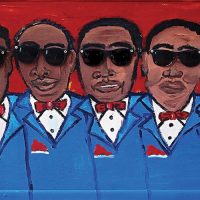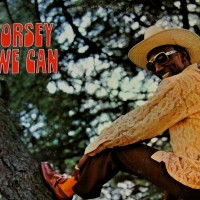Allen Toussaint, fonky-fonky pianist, writer and producer of untold hit songs, Rock and Roll Hall of Famer and first-chair favorite son, has died at 77.
In a career dating back to the 1950s, Toussaint served as side-stage Svengali for a series of seminal New Orleans recordings by the likes of Lee Dorsey, Ernie K-Doe, Dr. John and the Meters, and Irma Thomas before shifting to the national scene via projects with Paul McCartney (Venus and Mars), the Band (Rock of Ages), Paul Simon (There Goes Rhymin’ Simon), Joe Cocker and Little Feat, among others. Along the way, he worked as a producer and composer with artists as disparate as Glen Campbell (“Southern Nights”), Bonnie Raitt and Boz Scaggs (“What Do You Want the Girl to Do?”), Ernie K-Doe (“Mother-In-Law”), Robert Palmer (“Sneaking Sally Thru the Alley”), Devo (“Working in a Coal Mine”), Labelle (“Lady Marmalade”), Warren Zevon (“A Certain Girl”), the Rolling Stones, Herb Alpert and the Yardbirds.
Perhaps best known was Campbell’s raucous country-rock reworking of “Southern Nights,” which Allen Toussaint always presented with a dream-like diaphanous quality. “He took it to the people!” Toussaint once told us in an exclusive Something Else! Sitdown, “and I thought that was wonderful. The story I was telling, I was concerned about that – not what it would make a person do. Glen Campbell decided he would make a person dance. And also, I think his version is so much more entertaining, because there’s music and there’s the story, where mine was mostly about the story, and the music almost stayed out of the way. I set it into a mode just to live that moment, as if talking the tune. I just love what folks bring to my songs, because everybody has their own signature. They all have something to say, as well.”
Through it all, Toussaint told us he never concerned himself with receiving the credit he was no-doubt due. “Not at all,” he said. “I’ve been very happy. I was in a comfort zone, and I still am in the comfort zone, in that position – being the one behind the scenes, putting stuff together. I really like that and I feel like that’s my forte. I’m completely satisfied with whatever due I’ve received.”
So complete was his gift, however, that Allen Toussaint wrote “Mother-In-Law,” a No. 1 hit for Doe in 1961, before he’d even found a wife. “Not at all!” Toussaint told us. “Comedians used to use mother-in-laws as the brunt of their jokes back then. It was very commonplace, before they could say any and everything like nowadays. So, it was quite natural to think of that when it was time to write a novelty-type song. It just came one day while writing. It was one of those moments. It wasn’t because of anything autobiographical or anything, though.”
And yet it got him in trouble at home, anyway. “I didn’t have a mother-in-law – but my grandmother, she sure was horrified,” Toussaint added, laughing. “She called me when it was out and it was hit, and she bawled me out. ‘Why did you write such a terrible song! Don’t know you know who I am?’ I apologized vehemently, and I think she eventually forgave me.”
In the Right Place, Dr. John’s first album with Allen Toussaint as producer and the Meters as his backing band, sent him to the Top 25 of the album charts – and provided the former Mac Rebennack with his signature song. “Right Place, Wrong Time” shot all the way to No. 9 on the Billboard Hot 100 singles chart, and helped set a template for the emerging funk genre of the 1970s.
“It was a lot of fun, a lot of fun,” Toussaint told us, in a 2012 talk. “For one thing, we always had a wonderful time. We didn’t always look at the big picture. We were making fun music, and doing it at our pace. The Meters, that was a most magical group. Everyone in that band was so interlocked in, it was pure joy.”
Allen Toussaint’s composition “Life” was a key album cut on In the Right Place, while “Such a Night” also charted. The group would later collaborate on the underrated follow-up Desitively Bonnaroo, which would eventually inspire the name of an annual four-day Tennessee music festival.
[SOMETHING ELSE! REWIND: Allen Toussaint’s 1996 release ‘Connected’ remains this largely underappreciated gem, with highlights including “Funky Bars,” “Oh My” (a favorite) and “Ahma.”]
He also played a key role through the history of the Band, beginning with a turn arranging horn charts for “Life is a Carnival,” the opening track on 1971’s Cahoots. This would become another of his signature relationships in rock music, as Toussaint returned to arrange and lead the horn section for the double-live Rock of Ages LP in 1972, worked with the Band on their Last Waltz 1976 concert, saw his tune “You See Me” included on their 1998 release Jubilation, then worked with the late Levon Helm on 2009’s Electric Dirt. Rock of Ages, later reissued as Live at the Academy of Music, went to No. 6 on Billboard’s Top 200 album charts.
Yet it wasn’t until far more recently, after Hurricane Katrina’s devastation of Allen Toussaint’s hometown, that he began to more fully explore his career as a solo artist. A pair of well-respected projects followed (2006’s The River in Reverse with Elvis Costello and 2009’s The Bright Mississippi with Joe Henry) followed.
“It ended up being almost like a blessing for many of us, especially myself,” Toussaint said of the storm, which devastated New Orleans in 2005. “It made us flex new muscles. We lived our lives down here in New Orleans and it easy to become complacent. It’s such a comfortable pace. But Katrina came along and made us try other things, to move away for a period. With me migrating to New York as I did, I was right in the midst of where a lot of things were going on – and I was easily accessible, being right there where the action was. That brought about some collaborations that were very healthy for me. I began even doing live performances on a regular basis, which was unusual for me but quite rewarding. What I do is all about reaching the public, however, it had been done via the studio – waiting for the red light to come on. Doing a live performance, I was right in the meat of the matter, so that was good. Collaborations like the one with Elvis Costello, we got together and recorded together and toured. Many wonderful things happened.”
[SOMETHING ELSE! REWIND: Robbie Robertson goes in depth with Nick DeRiso on the Band’s 1971 concert collaborations with Allen Toussaint at the Academy of Music.]
The Bright Mississippi saw Allen Toussaint explore more fully the influence of jazz in his music – highlighted by a poignant take on Duke Ellington’s “Solitude.” Elsewhere, they reinterpreted classic tunes popularized or written by fellow sons of New Orleans like Louis Armstrong, Jelly Roll Morton and Sidney Bechet, but also sprinkled in a liberal portion of these ageless jazz gems – putting Toussaint in a whole new light, and garnering him a Grammy nomination.
The always-modest Toussaint, who subsequently returned to his beloved Louisiana, once again gave all of the credit to Henry. “He did everything but play piano!” Toussaint told us, laughing. “He chose all of those wonderful songs; he chose the musicians; he chose when and where to record. I just thought he did a delightful job. For him to see me in that light, that was quite an honor. I’ll forever be thankful for that. It would have dawned on me, I don’t think, to do that album.”
Songbook, released in 2013, took in the full scope of this legacy, as Allen Toussaint performed songs from throughout his storied career before an enraptured audience. It works now as a final reminder of Toussaint’s role as a behind-the-scenes, ever-gracious, forever-grooving genius.
- Nick DeRiso’s Best of 2015 (Rock + Pop): Death Cab for Cutie, Joe Jackson, Toto + Others - January 18, 2016
- Nick DeRiso’s Best of 2015 (Blues, Jazz + R&B): Boz Scaggs, Gavin Harrison, Alabama Shakes - January 10, 2016
- Nick DeRiso’s Best of 2015 (Reissues + Live): John Oates, Led Zeppelin, Yes, Faces + others - January 7, 2016




A sweet man, a major and positive influence on American music.